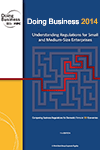Overview
Fair, speedy trials are essential for small enterprises embroiled in disputes. If business disputes take months or even years for courts to resolve, small firms might not have the financial strength to stay in business that long, regardless of trial outcomes. In such cases justice delayed is justice denied. Though small and medium-size enterprises usually try to avoid going to trial, effective contract enforcement systems matter for them. Efficient courts and enforcement reduce informality, improve access to credit and increase trade.
An e-court is a suite of services that entails minimum use of paper from when a case is filed until its disposal. Korea ranks first in the world on the E-Government Readiness index, a composite measure of the capacity and willingness of economies to use e-government for development. As early as 1986, Korea launched a case management system platform for internal court users. This was later expanded to allow external users to search the database of cases and in 2010 Korea launched the electronic case filing system which enables electronic submission, registration, service notification and access to court documents. Challenges included anticipating the needs of users at the design stage, convincing users to transition to e-filing and securing funding for maintaining and enhancing the system. In 2012 lawyers filed just over a third of the nearly 1 million cases electronically. Every month more attorneys are using the new system, attracted by its convenience.
Benefits of e-courts include cost and space savings, increased security, greater transparency, and expanded access to justice with round the clock filing and remote access. The data show that contract enforcement is faster in economies with e-filing.

